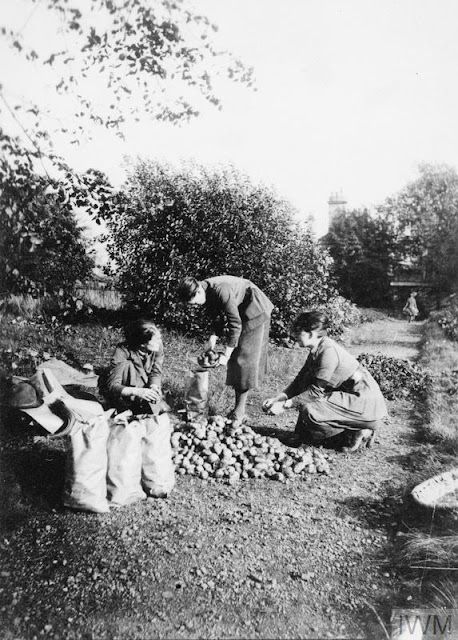In preparation for the Durham at War volunteers’ conference which is happening this weekend, we have been looking for recipes in the newspapers for our First World War Bake Off. This was partly inspired one of the talks we attended at the Voices of the Home Fronts conference at The National Archives back in September, that was bread and the restrictions placed on it.
 |
| Members of the Glasgow Battalion, Women's Volunteer Reserve tending to the potatoes grown on their plot, c.1915 © IWM (Q 108002) IWMNon Commercial Licence |
We have recently had a volunteer going through the Auckland Chronicle for 1917, around the time that food shortages were getting more severe. Despite potatoes initially being used to help pad out bread, by spring, they themselves were becoming scarce as the following newspaper articles recount.
22 March 1917
Potatoes over price
The first prosecution at Stanley
The first case in the district of having sold potatoes in excess of the Potato (Main Crop) Prices Order came before Stanley magistrates on Monday, when Patrick McCarthy, aged 69, was charged with having retailed four stones of the now much prized tubers to Catherine Noble at the rate of 2s per stone, being 3d in excess of the restricted price.
The defendant, who pleaded not guilty, saying that those were seed potatoes, was discharged on payment of costs.
Mrs Ed. Wilson (62 Maple Street) said she bought potatoes to cook for their dinner. She paid 1s for half a stone.
PC Graham saw the defendant on 28 February owing to a complaint from Mrs Wilson, and cautioned him that if he continued to sell potatoes at 2s instead of 1s 9d he would be reported. He said that he had paid a big price and wanted to get something out of them. The defendant said that he sold no more potatoes at 2s after being cautioned.
The case was, as already stated, dismissed on the payment of costs (9s), but the Chairman cautioned the defendant not to repeat the offence.
29 March 1917
Remarkable Scene at Stores
Remarkable scenes were witnessed on Saturday morning at the Co-operative Stores, Shildon. The manager had succeeded in securing a quantity of potatoes, and it was decided to apportion them out as long as they lasted at the rate of 4lbs per member. Special arrangements were made to cope with a rush of customers, but so great was the crush that one woman fainted.
The whole of the potatoes were sold out in an hour and a half, and at least 200 would-be purchasers were turned away unsupplied.
5 April 1917
Attempted Potato Raid
Thomas McBurnie, aged 26, and Clarence McBurnie, aged 24, were each charged with the attempted larceny of potatoes, at West Herrington, on 3 March.
PC Adams said that on the date names about 11:45pm, he visited the potato pits of Mr William McLaren, farmer, Herrington Hill, and observed two men going along the fence side. One had a bag. He said to them, ‘Now the, what is this game?’ and one of them replied, ‘Well, it is a fair cop, we won’t deny it; we were fairly held; we were going to the pits to get some potatoes.’ Both commented to plead not to be summoned, and one said they were ‘hard up’. The place was about 140 yards from the highway.
The defendants pleaded guilty to the charge, and had nothing to say.
They were each fined 30s.

No comments:
Post a Comment